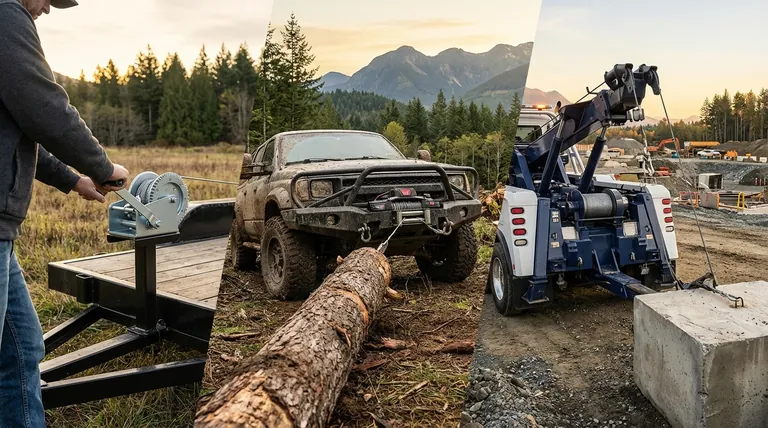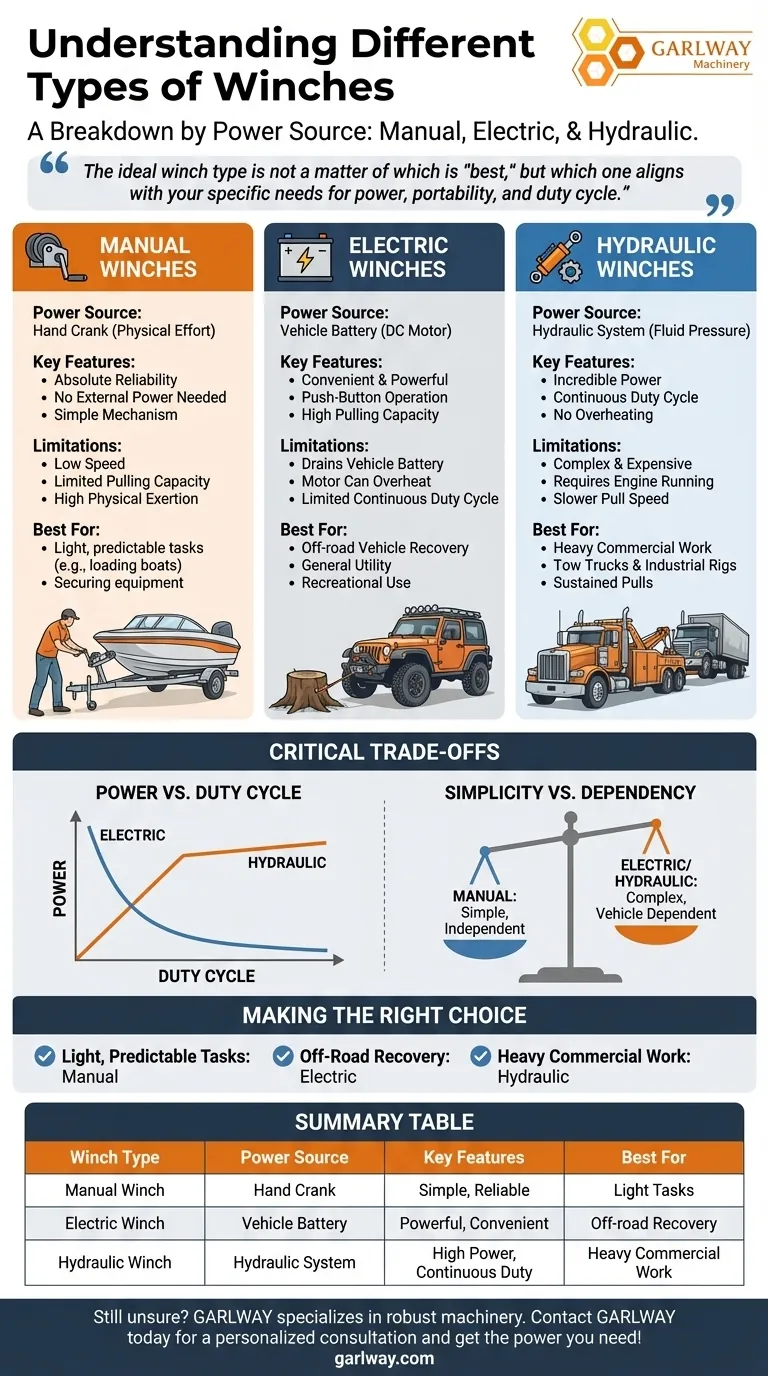At its core, a winch is categorized by its power source. The three primary types are manual, electric, and hydraulic. While manual winches serve niche purposes and hydraulic winches dominate industrial applications, electric models have become the most common and versatile standard for vehicle recovery and general utility use.
The ideal winch type is not a matter of which is "best," but which one aligns with your specific needs for power, portability, and duty cycle. Understanding the trade-offs between a simple hand-crank and a complex hydraulic system is the key to making the right choice.

The Core Winch Types: A Breakdown by Power Source
The fundamental difference between winches lies in how they generate the force needed to pull a load. This power source dictates their performance, complexity, and ideal application.
Manual Winches: Simplicity and Reliability
Manual winches are operated by a hand-crank. They rely entirely on your physical effort to generate pulling force through a system of gears.
They are valued for their absolute reliability. With no motors or electrical components, there is very little that can fail, making them a dependable tool for smaller jobs.
Their primary limitations are pulling capacity and speed. They are significantly slower and less powerful than motorized winches and require considerable physical exertion.
Electric Winches: The Versatile Standard
Electric winches are the most popular type, especially for consumer applications like off-roading. They are powered by a DC electric motor that draws current from your vehicle's battery.
Their key advantage is convenience and power. They offer substantial pulling capacity at the press of a button, making vehicle recovery and heavy lifting tasks manageable for one person.
The main drawback is their reliance on battery power. A long, heavy pull can drain a vehicle's battery, and the motor can overheat if used continuously for extended periods, requiring rest periods.
Hydraulic Winches: The Industrial Powerhouse
Hydraulic winches tap into a vehicle's power steering pump or a dedicated hydraulic system for power. They convert hydraulic fluid pressure into immense pulling force.
Their defining feature is their incredible power and continuous duty cycle. Because the hydraulic system is cooled, these winches can pull heavy loads for long durations without overheating.
However, they are more complex and expensive to install. They can also only operate when the vehicle's engine is running to power the hydraulic pump, and they tend to pull more slowly than electric models.
Understanding the Critical Trade-offs
Choosing a winch involves balancing competing factors. What you gain in one area, you often sacrifice in another.
Power vs. Duty Cycle
An electric winch can offer immense pulling power but has a limited duty cycle. The motor generates significant heat and must be allowed to cool down after a few minutes of hard work.
A hydraulic winch, while often slower, can run continuously under load. This makes it the only viable choice for commercial applications like tow trucks or industrial rigs where long, sustained pulls are common.
Simplicity vs. Dependency
A manual winch is the peak of simplicity. It needs no external power, making it a foolproof option for light tasks where a vehicle or power source may not be available.
Electric and hydraulic winches offer incredible convenience but are entirely dependent on a vehicle's electrical or hydraulic systems to function. A dead battery or a failed engine renders them useless.
Application and Installation
The intended use case largely dictates the best option. Electric winches are perfect for the intermittent, high-stakes needs of off-road recovery. Hydraulic winches are built for the daily grind of commercial work. Manual winches are best for predictable, light-duty pulling like loading a boat onto a trailer.
Making the Right Choice for Your Application
Your final decision should be guided entirely by your primary use case.
- If your primary focus is light, predictable tasks: A manual winch offers unmatched reliability and cost-effectiveness for jobs like securing equipment or loading small vehicles.
- If your primary focus is off-road vehicle recovery: An electric winch provides the best balance of power, speed, and ease of installation for personal and recreational use.
- If your primary focus is heavy, continuous commercial work: A hydraulic winch is the only option that delivers the sustained power and durability required for industrial applications.
Ultimately, aligning the winch's power source and operational limits with your specific task is the key to ensuring it performs safely and effectively when you need it most.
Summary Table:
| Winch Type | Power Source | Key Features | Best For |
|---|---|---|---|
| Manual Winch | Hand Crank | Simple, reliable, no power needed | Light, predictable tasks (e.g., loading boats) |
| Electric Winch | Vehicle Battery | Powerful, convenient, easy to install | Off-road vehicle recovery, general utility |
| Hydraulic Winch | Hydraulic System | High power, continuous duty cycle | Heavy commercial/industrial work |
Still unsure which winch is right for your project?
GARLWAY specializes in providing robust construction machinery, including a full range of winches, concrete mixers, and batching plants. Our experts can help you select the perfect winch for your specific application, ensuring safety, efficiency, and reliability for construction companies and contractors worldwide.
Contact GARLWAY today for a personalized consultation and get the power you need!
Visual Guide

Related Products
- Ready Mixer Machine for Construction Ready Mix Machinery
- Commercial Construction Mixer Machine for Soil Cement Mixing Concrete
- Small Electric Winch 120V and 240V for Compact Applications
- Electric and Hydraulic Winch for Heavy Duty Applications
- 12000 lb Heavy Duty Electric Boat Winch
People Also Ask
- How do electric winches provide power and performance? Achieve Superior Pulling Power & Control
- What special considerations apply to rope-to-chain splices? Master Windlass Performance & Safety
- How does a winch affect vehicle performance in different climates? Understand the Critical Trade-offs
- What type of accessories should be used for setting up the winch? Build a Safe and Efficient System
- What are the main advantages of using electric winches for vehicle recovery? Gain Safety and Self-Sufficiency
- What are some advantages of drum winches? Achieve Superior Anchoring with Simplified Installation & Reliability
- How does a towing winch function? Unlock the Power to Pull Heavy Loads
- Why might an electric winch increase trailer rental appeal? Boost bookings and safety with this key upgrade.



















